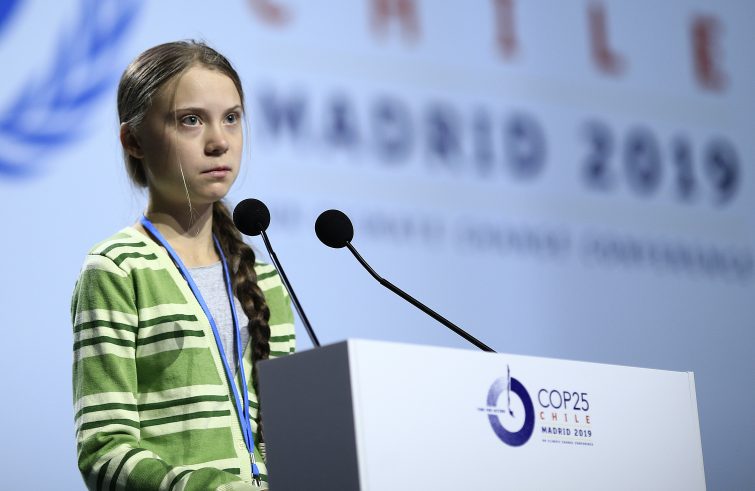
“We see the climate crisis as something that will be affecting us in the future. And it certainly will. But we tend to forget that countless people are already suffering and dying from its consequences, because the climate crisis is already affecting us.” These extremely wise words were spoken by an 18-year-old girl, internationally renowned for the past three years. Scarp de’ tenis, a street magazine supported by Caritas, published an exclusive interview with Greta Thunberg, founder of the Fridays for Future movement. She said: “We must do everything in our power to save the planet. ‘The climate crisis is also a social crisis, and it chiefly affects the most vulnerable.”
 “The world according to Greta” is the title of the interview by Adrian Lobb for street newspapers distributed in countries all over the world. Greta has come a long way since the 2018 school strike in front of the Swedish Parliament (School Strike for Climate). She mobilised millions of her peers in an innovative environmental movement. She met world leaders and stirred consciences. She has inspired young people taking their first steps into activism. Contacted by phone at her home in Stockholm, she said that the climate crisis “has spiralled out of control.”
“The world according to Greta” is the title of the interview by Adrian Lobb for street newspapers distributed in countries all over the world. Greta has come a long way since the 2018 school strike in front of the Swedish Parliament (School Strike for Climate). She mobilised millions of her peers in an innovative environmental movement. She met world leaders and stirred consciences. She has inspired young people taking their first steps into activism. Contacted by phone at her home in Stockholm, she said that the climate crisis “has spiralled out of control.”
The 18-year-old activist is determined to share her views. In fact, she is keen to use them – in a three-part BBC documentary series – to highlight and amplify the voices of scientists warning us of the need to act decisively and act now. “That was the very reason why I decided to do this in the first place,” she said. “I wanted us to get beyond the clickbait headlines that people use to gain attention and to focus on the content instead. So if using my platform to lend my voice to science or people who actually need to be heard works, then that was the main purpose of the series.”
Did seeing more of the world make you even more determined to save it?
I don’t think you need to be able to see it to want to protect it. But it has been an amazing opportunity to have seen it. We talk like it’s not until it’s burning in our own backyards and in our own towns that we act, but that makes no sense. If we look at the wildfires in western North America, the evidence is clear that it has connections to the climate crisis. But that doesn’t mean the people who live there will change their lifestyles.
I want to raise awareness and say: this is what the science says. You should listen to and act on the science.
We won’t be able to avoid all the consequences of it – that’s already too late – but it’s never too late to do as much as we possibly can.
In your new documentary you say the only thing that creates hope is action…
We can sit and do nothing and that may feel very hopeless, but as soon as we start taking action, there is hope. That’s the mentality I’m trying to live off. And just imagine if we started to actually take action – I mean, we don’t know what that could lead to. We don’t know what social tipping points we could pass. Because we’ve never done it before. We’ve never faced a challenge such as the climate crisis before. So we don’t know what could happen if we took action – and that is also very hopeful.
The growing numbers joining your campaign may not make sufficient change. What can be done do amplify the voices of climate activists?
If the media started treating the climate crisis like a crisis, that could change everything overnight. Indeed, we need to do everything we can – all these small-scale actions – and enrol every possible person. But at the same time, not be naive and think things will be enough if only we do this. Large-scale strategies ought to be put in place as well.
What do you ask of the media – reporting the science, rallying people behind it, not giving a platform to sceptics?
All those things. But above all they must treating the climate crisis like a veritable crisis. Right now, the media is reporting about climate change, the climate issue and symptoms of the climate crisis like melting glaciers and rising sea levels and wildfires. But those are only the symptoms. The climate crisis is mostly caused by the amount of accumulated CO2 in the atmosphere.
We shouldn’t be focusing on vague, hypothetical scenarios in the future but rather on what needs to be done now, treating it as a serious crisis.
That’s by no means impossible. Take the coronavirus pandemic. Did we treat that as a crisis? Yes. That shows the media is capable of treating something like a crisis and changing the way they operate. As long as the climate crisis is not dominating the news, it sends a signal that maybe it’s not important.
 What are your plans for the near future?
What are your plans for the near future?
Two more years of school, then university. I will focus on many more things as well, but I will do it in addition to this, to my commitment. I want to be able to say that I did everything I possibly could. And I am doing my utmost to keep my word.
By choosing to speak to INSP- street newspapers, you are actively helping address poverty and homelessness. In fact, often people in poverty are the first to be affected…
All these things are interlinked. Being a climate activist or environmental activist is not because you care about trees or flowers. Of course, we do care about that too, but we are mainly doing this because what we do to nature, nature does to us. The climate crisis is a social crisis. It mostly affects people who already are the most vulnerable. So without having that in mind, without taking that into account, we won’t be able to solve the climate crisis. I usually say I try to stay out of politics. But some things are beyond politics, like fundamental human rights. We’re talking about social justice. It should be obvious for everyone to care about it.
Do you have a final message for readers eager to join your mission?
Everyone is important, everyone counts. Sometimes we tend to think that an individual cannot do anything alone. My protest outside the Swedish Parliament on my own shows that every person can make a difference. But if we want the world to change, everyone must be involved. So no step in the right direction is too small.
*Courtesy of: INSP.ngo/The Big Issue UK @BigIssue










